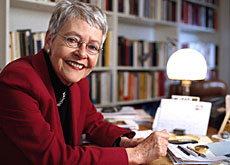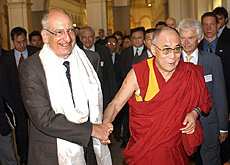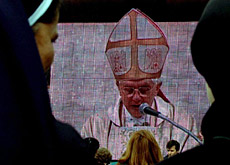Holy stars succour disillusioned church-goers

Religion expert Klara Obermüller tells swissinfo why the Dalai Lama attracted audiences of thousands while established Swiss churches continue to lose members.
She says the Christian churches need to rediscover the mystique that once surrounded the faith, if they are to fill the pews again.
swissinfo: Are you personally familiar with Buddhism?
Klara Obermüller: I have absolutely no connection with the spirituality of the East. I’m firmly anchored in the western Judeo-Christian tradition.
But a few years ago I saw an exhibition of Buddhas. Some were laughing uproariously, others were deep in contemplative thought. I thought at the time that growing up surrounded by such figures must lead to a different understanding of the world, a different feeling, from what we have, who have grown up with the image of the martyred Christ on the cross.
swissinfo: Religion today is heavily centred on “mega-events”. Are religious feelings something that can only be experienced when the Pope dies or the Dalai Lama comes to town?
K.O.: No, of course not, although that’s the message from the media. In recent years, such events have taken on more and more significance because they give people a strong feeling of community, and because the central figures – the late Pope and the Dalai Lama – are so charismatic.
swissinfo: During his visit to Zurich the Dalai Lama was attracting audiences of 10,000 every day. Why is Tibetan Buddhism so popular in Switzerland?
K.O.: If I wanted to be mean, I could say that it’s because people know so little about it. And what they do know is so appealing. Buddhism is seen as forgiving, it strikes a chord with our humanity, with its message of sympathy, mercy and goodwill towards people, animals and nature in general.
These are values which we all hold in high regard and which we would like to embody personally. These values also play an important role in Christianity, Judaism and Islam. But only in Buddhism are they all considered equally important. And then there’s the exotic element: everything to do with Buddhism seems so happy, peaceful and colourful. One feels good as a result.
swissinfo: What do churches in Switzerland have to do to win back their congregations?
K.O.: Phenomena such as the massive crowds who turned out to see the Dalai Lama present a huge challenge for the churches in Switzerland because they reveal the shortcomings of the established faiths. They are not satisfying the needs of their congregations and they have other internal problems, too.
The reformed church is particularly focused on the word of God. A Sunday service consists of a few hymns, a sermon and some readings from the Bible.
A Catholic Mass is a little more spiritual – one feels more emotion – but Catholicism has become more uncompromising recently. It no longer ‘moves’ people or, to put it more poetically, touches their hearts.
Obviously this is not to suggest that churches in Switzerland incorporate aspects of Buddhism into their services. But they need to think about how to reach people emotionally and how to foster a feeling of community.
Much has to do with language. In Zurich, the Dalai Lama offered simple messages in language that everyone could understand. He didn’t say anything special, but what he said went straight to the heart.
swissinfo: Does history play a role?
K.O.: Certainly. The Christian churches have spent centuries using threats and guilt. Many people have the feeling that Christianity consists only of obligations and prohibitions. And the message was: if one doesn’t obey, one is punished and sent to hell.
Buddhism is not about images of God or dogma. And that makes it more bearable, at least at first sight.
It would be wonderful if the Christian churches could again recognise that, in our own tradition, faith takes many forms, and it is these that touch people. I’m thinking about the mystique, the traditions of piety, the bonds of community. I think it’s very important to exhaust your own sources of spirituality before you turn to others.
swissinfo: Is a dialogue among religions possible? And where are the boundaries?
K.O.: It’s very important that a dialogue takes place. For a long time religions were in conflict with each other. Today we meet, talk, sing, celebrate and pray together, and through this we have the opportunity to find out what we have in common.
And we have a lot in common, especially when it comes to ethics. There is no religion which does not speak of peace and goodwill towards others. We can learn about each other through these values.
The difficulty comes when we descend into dogma, and become fixated on the teachings. This is where there are differences, and one should not sit in judgement on others.
Religion should be varied and diverse in terms of rituals, clothing, and in terms of the content of the faith. This variety should be preserved. For me, an inter-religious dialogue is one where we seek common ground while acknowledging our differences in good faith.
swissinfo-interview: Renat Künzi
Tibet’s spiritual leader, the Dalai Lama, has spent the past week in Zurich.
His lectures on Buddhism drew audiences of 10,000 daily.
Klara Obermüller, a publicist, is an expert on religion and culture.

In compliance with the JTI standards
More: SWI swissinfo.ch certified by the Journalism Trust Initiative



You can find an overview of ongoing debates with our journalists here. Please join us!
If you want to start a conversation about a topic raised in this article or want to report factual errors, email us at english@swissinfo.ch.